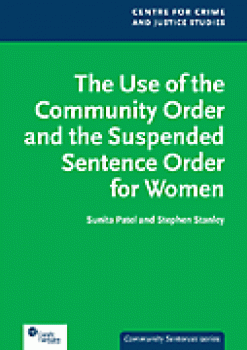The Use of the Community Order and the Suspended Sentence Order for Women

The use of interventions for women offenders serving community sentences is dependent upon the availability of local services and priorities, according to a report published by the Centre for Crime and Justice Studies.
The report, which examines the use of the new Community Order and Suspended Sentence Order for women found that many of the requirements which make up the sentence are not used. In particular, the specified activity requirement could be used more often and also requirements to meet mental health and drug treatment needs for women.
The Use of the Community Order and Suspended Sentence for Women, supported by the Esmée Fairbairn Foundation, says there is limited evidence that the sentences are more innovative and responsive to the circumstances of women offenders than previous community sentences. It also notes that the there is little evidence that the sentences have had a significant impact on reducing the use of custody for women, as was hoped prior to their introduction in April 2005.
The report's key findings are:
- Despite concerns prior to the introduction of the new orders, women do not seem to be overburdened by the number of requirements given to them.
- There seems to be evidence of some form of gender differentiation in terms of the requirements that are used more frequently for women, i.e. supervision versus unpaid work.
- Community sentences on women were most likely to be for offences involving theft or fraud and less likely to be for summary offences than those on men.
- The rate of termination for failure to comply with requirements is relatively high.
- The use of combinations of requirements in the new orders seems to be dependent on the availability of services, local policies and the specific needs of women offenders in different areas.
- Most combinations of requirements appear to mirror previous community sentences.
- There are significant local variations in the use of requirements.
- There is little evidence that the introduction of the new orders has had a significant impact on the use of custody for women. If there has been an impact, it is very limited, with an estimated 10 per cent of Suspended Sentence Orders substituting for immediate custody, and it is most likely to be on the use of short custodial sentences for summary offences.
Enver Solomon said:
`Whilst the current focus is on prison overcrowding it is vital not to over look the use of community sentences. Our research has found that these sentences are currently not being used as effectively as they could be for women with multiple needs who enter the criminal justice system. This raises important issues for the Ministry of Justice in its attempt to promote the greater use of community sentences.'